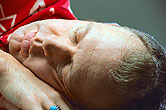 |
 |
 |
||
    |
||||
|
||||

Too Little Sleep May Raise Diabetes Risk
Less than 6 hours of slumber per night heightened the odds, study found|
|
HealthDay
By Kevin McKeever
Wednesday, March 11, 2009
 WEDNESDAY, March 11 (HealthDay News) -- A good night's sleep may help lower your risk of developing type 2 diabetes, researchers say.
WEDNESDAY, March 11 (HealthDay News) -- A good night's sleep may help lower your risk of developing type 2 diabetes, researchers say.
People averaging less than six hours of shuteye during the work week over a period of years were shown to have nearly five times the chance of developing the disease compared to those who averaged six to eight hours of sleep, according to research scheduled to be presented Wednesday at an American Heart Association conference in Palm Harbor, Fla.
"This study supports growing evidence of the association of inadequate sleep with adverse health issues. Sleep should be assessed in the clinical setting as part of well-care visits throughout the life cycle," study lead author Lisa Rafalson, a research assistant professor at the University at Buffalo in New York, said in a news release issued by the association.
The study, in which 1,455 people reported on their sleep habits, compared fasting glucose levels on people over a six-year period. The results were based on adjustments made for age, body mass index, glucose and insulin concentrations, heart rate, high blood pressure, family history of diabetes and symptoms of depression.
The study found no significant difference in fasting glucose levels or risk of developing type 2 diabetes between those who averaged six to eight hours of sleep during weeknights and those who averaged more than eight hours a night.
"Our findings will hopefully spur additional research into this very complex area of sleep and illness," Rafalson said.
HealthDay
Copyright (c) 2009 ScoutNews, LLC. All rights reserved.
Related News:
More News on this Date
Related MedlinePlus Pages:
| Home | Health Topics | Drugs & Supplements | Encyclopedia | Dictionary | News | Directories | Other Resources | |
| Disclaimers | Copyright | Privacy | Accessibility | Quality Guidelines U.S. National Library of Medicine, 8600 Rockville Pike, Bethesda, MD 20894 National Institutes of Health | Department of Health & Human Services |
Date last updated: 12 March 2009 |
